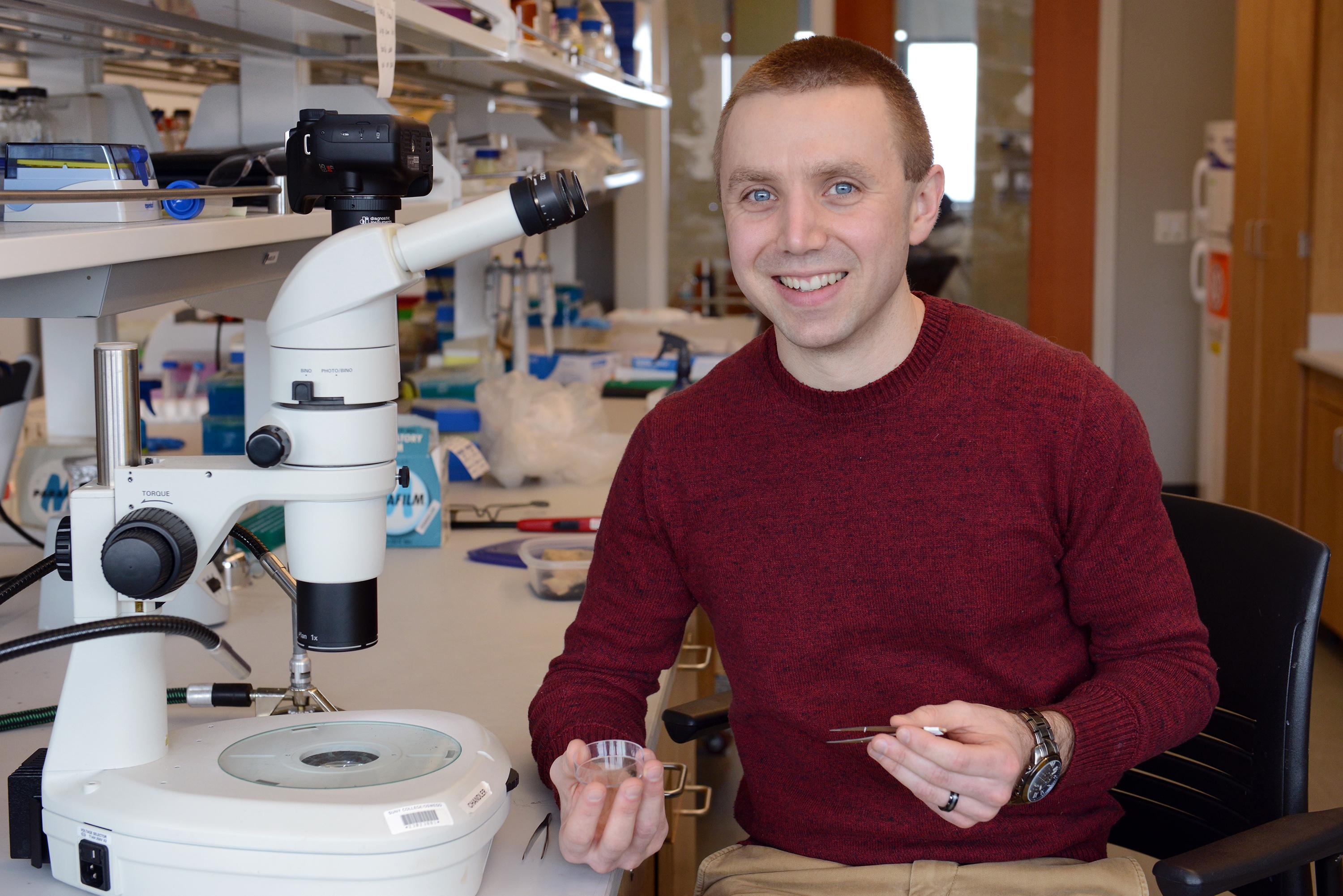Career achievement—Dr. Christopher Chandler of SUNY Oswego’s biological sciences department recently earned a highly competitive National Science Foundation Faculty Early Career Development grant. The award, the most prestigious the foundation gives junior faculty, will provide more than $640,000 over the course of five years to fund advanced genomic research for Chandler and his students.
A major National Science Foundation grant recognizes the research and accomplishments of SUNY Oswego biological sciences faculty member Christopher Chandler while providing research opportunities for his students at Oswego and overseas.
The highly competitive NSF Faculty Early Career Development grant is the foundation’s top award “in support of junior faculty who exemplify the role of teacher-scholars through outstanding research, excellent education and the integration of education and research,” according to its website. The grant of more than $640,000 over five years will enable continued and advanced genetics study for Chandler and his students.
“This very prestigious and competitive award celebrates the high quality of teaching and research that Oswego’s faculty offer,” President Deborah F. Stanley said. “It speaks highly of our college, faculty members like Dr. Chandler and the opportunities we provide students—from our on-campus labs in the Shineman Center to our unique Global Labs around the world. Dr. Chandler has been a shining star since joining our college, and I congratulate him for his excellence in teaching, commitment to student success and work as a leader in his field.”
These grants usually go to research universities with large graduate programs. Chandler’s award shows that Oswego is a competitive destination for talented faculty and students, said department chair Jim MacKenzie.
Chandler’s funded project works with isopods commonly known as pillbugs or potato bugs. They “are a special species that has bacteria that live in them that can cause them to change from male to female to ensure the survival of the species,” he explained.
“Understanding the sex chromosomes in the genes is very important,” Chandler said. “From an evolutionary standpoint, we think this is key to understanding how one species may divide into two species.”
The grant will allow Chandler and his students to expand their research and collect more data, and it will provide more hands-on research for students. Chandler currently makes genomic research available in a small Biology 492 capstone class, but this grant can allow this work to become more cutting-edge, replicable and widely disseminated. More students will be able to start more new projects with expanded roles for hands-on research, skills acquisition and increased datasets, he said.
Creating opportunities
Chandler joined Oswego’s faculty in 2012 after receiving his doctorate in ecology and evolutionary biology from Iowa State University, followed by postdoctoral research at Michigan State University. His teaching, research and mentoring skills have benefited students and earned attention and encouragement at Oswego.
“The award places particular emphasis on the interconnectedness between research and education,” said Lorrie Clemo, provost and vice president for academic affairs at Oswego. “He inextricably links the role of scholar and educator by feeding what is going on in his lab and the greater scientific community, directly back into his teaching. Chandler’s award will help Oswego attract additional scholars of excellence, which will have vital implications for research findings and discoveries in the coming years.”
Chandler’s research, coinciding with the opening of the Shineman Center and its advanced labs, creates opportunities that better prepare students for a range of professional work and continued studies after graduation.
“These genomic skills have applications in all kinds of areas, including evolutionary biology, ecology, medicine—any areas where genetic research is increasingly in demand,” Chandler noted. “The biological knowledge is important but also the computational tools, and gaining analytic skills will greatly help students.”
The grant also will help launch an international partnership and opportunity for a new site in Oswego’s distinctive Global Laboratory network. A small pilot student group will travel to the University of Poitiers in France this summer to examine the feasibility of an extended Global Laboratory project, Chandler said.
Students like junior zoology major Don Wang speak highly of Chandler’s encouragement and enthusiasm that sometimes alter their career trajectories. Wang met Chandler the summer before starting at Oswego and stopped by the faculty member’s office in the first few weeks of his first semester to begin a fruitful DNA research collaboration.
“The following summer I was granted the privilege of working with him and was funded by the Faculty-Student Challenge Grant. After the first summer of my research, I have been trying to consistently follow the project and work on it when I can,” Wang said. “Because of this project, I was able to build a strong foundation in genomics research. This project also has changed my plans following my undergraduate career, and has convinced me that research is something that I want to do at a higher level.”




